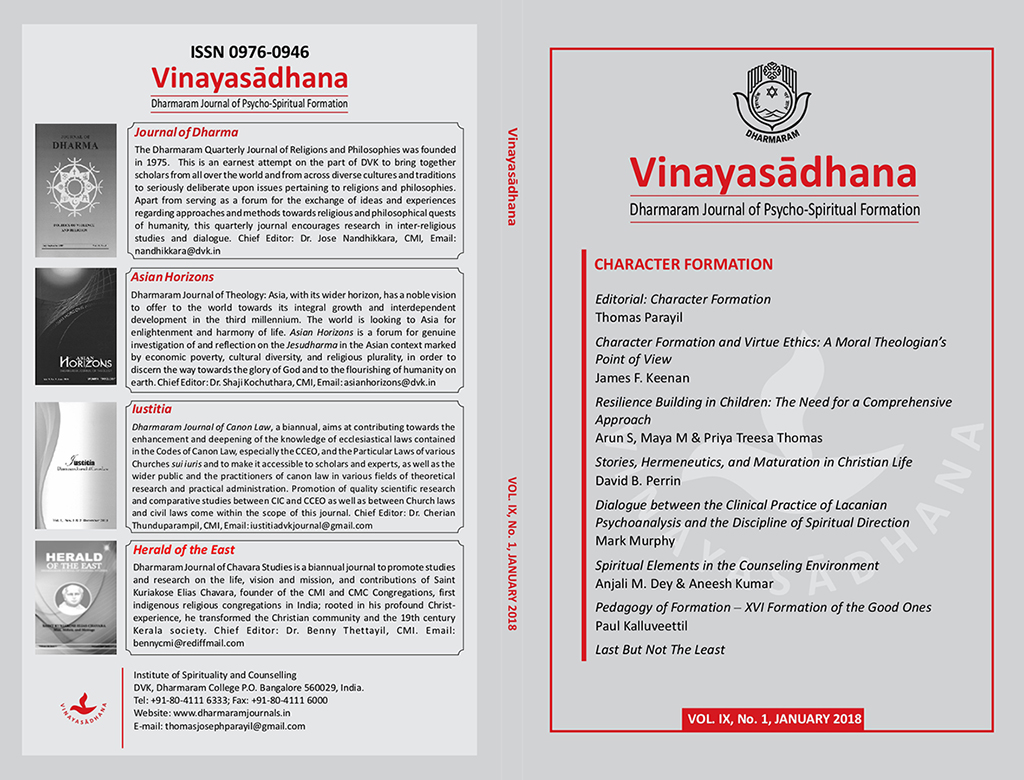Resilience Building in Children
The Need for a Comprehensive Approach
Keywords:
Comprehensive approach, Religion, School, Family, Children, Resilience buildingAbstract
Resilience is considered to be a positive attribute of an individual. It is the ability of a person to face the difficult situation in life. This paper tries to understand the meaning and significance of resilience and focus on the risk factors that act as a hindrance to the proper development of an individual and the process of resilience building. Attention is paid to the changes in major institutions like family, schools, and religion. The role of technology and media in contemporary society is also mentioned. After locating a child in contemporary society, the paper also examines the existing frameworks and approaches that help in resilience building and raises the challenges. The central argument of the paper is to have a comprehensive approach that put children as the locus and demanding cooperation from all stakeholders.
References
American Psychological Association. (2014). The Road to Resilience. Washington DC: American Psychological Association. Retrieved from http://www.apa.org/helpcenter/road-resilience.aspx
Arun, S. (2017). Family and Societal Values in the Changing Globalised World: A Social Work Perspective. Adelaide Journal of Social Work, 4(1), 82-92.
Campbell-Sills, L., Cohan, S. L., & Stein, M. B. (2006). Relationship of resilience to personality, coping, and psychiatric symptoms in young adults', Behaviour Research and Therapy, 44(4), 585–99.
Cicchetti, D. (1989). Developmental Psychopathology: Some thoughts on its evolution. Development and Psychopathology, 1, 1-4.
Craig, S. L., Austin, A., & McInroy, L. B. (2014). School-based groups to support multiethnic sexual minority youth resiliency: Preliminary effectiveness'. Child & Adolescent Social Work Journal, 31(1), 87–106.
Fonagy, P., Steele, M., Moran, G., Steele, M. & Higgitt, A. C. (1991). The capacity for understanding mental states: the reflective self in parent and child and its significance for security of attachment.
Infant Mental Health Journal, 200-216.
Fraser, M. W., Galinsky, M. J. (1997). Toward a resilience-based model of practice. In M. W. Fraser (Ed.), Risk and resilience in childhood: An ecological perspective (pp. 265-275). Washington, DC: NASW Press.
Garmezy' N. & Rutter, M. (1985). Acute reactions to stress. In M. Rutter and L. Hersov (Eds), Child psychiatry: modern approaches (2nd Ed) (pp. 79-106). Oxford: Blackwell Scientific.
Garmezy, N. (1991). Resiliency and vulnerability to adverse developmental outcomes associated with poverty. American Journal of Behavioral Science, 34, 416-430.
Hawkins, D., Catalano, R.., & Miller, J. (1992). Risk and protective factors for drug problems. Psychological Bulletin, 112, 64-7.
Kaufman, J. & Zigler, E. (1989). The intergenerational transmission of child abuse. In D. Cieehetti and V. Carlson (Eds), Child maltreatment: theory and research on the causes and consequences of child abuse and neglect (pp. 129-150), Cambridge: Cambridge University Press.
Luthar, S. S., Cicchetti, D., & Becker, B. (2000). The construct of resilience: a critical evaluation and guidelines for future work. Child Development, 71(3), 543–62.
Masten, A. S. (2009). Ordinary Magic: Lessons from research on resilience in human development. Education Canada, 49(3), 28-32.
Mead, G. H. (1934/2015). Mind, Self, and Society. University of Chicago Press: Chicago.
Panter-Brick, C., & Eggerman, M. (2012). Understanding culture, resilience, and mental health: The production of hope. In M. Ungar (Ed.), The social ecology of resilience: A handbook of theory and practice (pp. 369_386). New York: Springer.
Pietrzak, R. H., & Southwick, S. M. (2011). Psychological Resilience in OEF-OIF Veterans: Application of a novel classification approach and examination of demographic and psychosocial correlates. Journal of Affect Disorders, 133(3), 560-568.
Rutter, M. (1985). Resilience in the face of adversity. Protective factors and resistance to psychiatric disorder. British Journal of Psychiatry, 147, 598–611.
Rutter, M. (2006). Implications of resilience concepts for scientific understanding. Annals of the New York Academy of Science, 1094(1), 1-12.
Schafer, M. H., Shippee, T. P., & Kenneth, F. F. (2009). When does disadvantage not accumulate? Toward a sociological conceptualisation of resilience. Schweiz Z Soziol, 35(2), 231–251.
VicHealth (2015). Interventions to Build Resilience among Young People: A Literature Review, Victorian Health Promotion Foundation, Melbourne.


